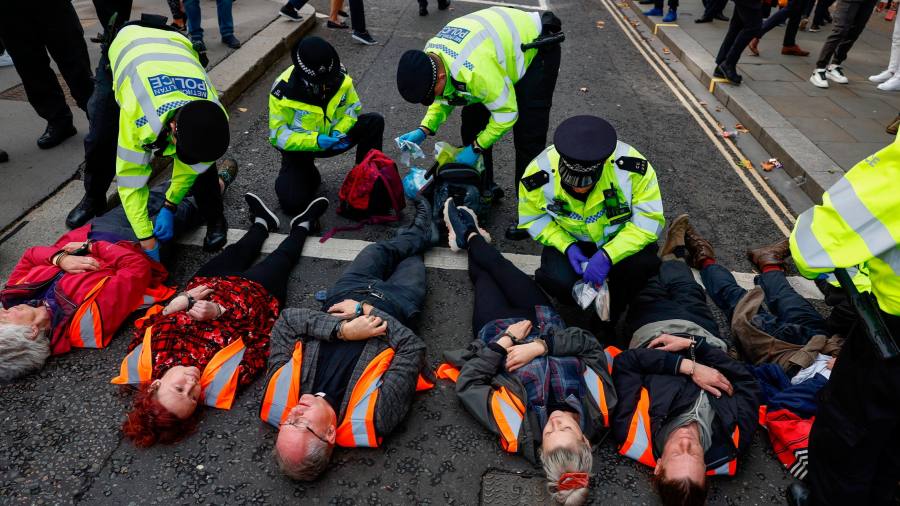[ad_1]
Rishi Sunak will on Monday propose new measures to help the police stop disruptive public protest in Britain, heading further down a route that has drawn heavy criticism from civil rights groups.
The prime minister wants to broaden the legal definition of “serious disruption” in a new public order bill, to help police stop what he calls a “disruptive minority” who use tactics such as blocking roads or slow marching.
Sunak believes the public and business will support the government’s efforts to stop protesters causing serious disruption following a series of high-profile protests by groups such as Just Stop Oil and Insulate Britain.
But Human Rights Watch, the international NGO, last week criticised the government for a series of recent measures, including restrictions on protest.
Tirana Hassan, acting HRW executive director, said the government had a “very short window” to reverse some of its decisions, before it joins “the countries listed as human rights abusers rather than human rights protectors”.
The government will this week table an amendment to the bill, currently in the House of Lords, which it says will give police “greater flexibility and clarity” over when to intervene to stop a “disruptive minority”.
Police have already been given additional powers to prevent protesters using what Downing Street calls “guerrilla tactics”, but police chiefs say there is uncertainty over what reaches the threshold of “serious disruption”.
The changes would mean that police will not need to wait for disruption to take place and can shut protests down before any “chaos” is caused, Downing Street said.
Police would not need to treat a series of protests by the same group as standalone incidents but would be able to consider their total impact; they would also be able to consider the cumulative effect of long-running campaigns over a number of weeks intended to cause repeat disruption.
Sunak said: “The right to protest is a fundamental principle of our democracy, but this is not absolute. A balance must be struck between the rights of individuals and the rights of the hard-working majority to go about their day-to-day business.”
Sir Mark Rowley, Metropolitan Police commissioner, said: “Increasingly police are getting drawn into complex legal arguments about the balance between that right to protest and the rights of others to go about their daily lives free from serious disruption.
“The lack of clarity in the legislation and the increasing complexity of the case law is making this more difficult and more contested.”
But Hassan said last week: “A slew of legislation was passed last year where fundamental human rights are being challenged. The protest law is something we are deeply concerned about.
“When you talk about civic space and about people’s right to participate in a democratic society, the right to peaceful assembly and the right to protest are key pillars of that. We’ve seen an outright assault from this government on that.”
HRW also criticised government measures including a new elections act which will require voter identification in polls and the plan to allow offshore processing of asylum claims in Rwanda.
[ad_2]
Image and article originally from www.ft.com. Read the original article here.

